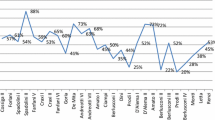I was trained in the Treasury for good or ill by a man who still ferociously pursues the public good … He showed me how to negotiate, how to draw breath in mid-sentence so as to discourage interruption, how to draft, and why the Service belongs neither to politicians nor to officials but to the Crown and to the nation.
—Ian Bancroft (cited in Hennessy 1989, p. 346).
Abstract
Many scholars lament that reforms first introduced in the late 1970s led to the demise of the Westminster administrative tradition. A recent body of research, however, has begun to question the death of the Westminster administrative tradition. This article contributes to this debate by focusing on an important tenet of this tradition: the permanency of civil servants. Using original longitudinal data of administrative heads in the UK between 1949 and 2014, this article investigates whether the relationship between several political events within the executive government and turnover of permanent secretaries has strengthened since 1979. The empirical results from cross-tabulation analysis and logistic regression suggest that over the last 60 years the relationship between political events in the executive and administrative turnover has largely remained unchanged. Since 1979, a change in the governing party, a change in the prime minister, and the re-election of a prime minister, do not lead to a greater increase in permanent secretary turnover. With the permanency of elite bureaucrats still intact, the evidence supports research suggesting that reforms since 1979 better reflect a pattern of institutional layering on top of the Westminster administrative tradition, rather than constituting its demise.

Similar content being viewed by others
Notes
This is not to suggest, however, that the only cause of turnover following a political event is the political motivations of governments to increase control. Factors such as retirement, death, and illness likely affect turnover. Importantly, however, there are no reasons to believe that these non-political factors are more likely in years following a political than in other years. In other words, presuming that non-political factors likely affect turnover equally in years following an event and years in which no event has occurred, we can gain the ability to see the influence of politics by comparing years following a political event with years in which there is no political events.
Recent evidence also suggests that governments continue to face resistance from civil servants to their efforts of reform (Paun et al. 2013, pp. 11–12).
References
Aucoin, P. 2012. New political governance in westminster systems: Impartial public administration and management performance at risk. Governance 25 (2): 177–199.
Barberis, P. 1996. The elite of the elite: Permanent secretaries in the British higher civil service. Aldershot: Dartmouth Publishing Company.
Bennister, M. 2012. Prime ministers in power political leadership in Britain and Australia. New York: Palgrave Macmillan.
Bertelli, A.M., and D.E. Lewis. 2013. Policy influence, agency-specific expertise, and exit in the federal service. Journal of Public Administration Research and Theory 23 (2): 223–245.
Bourgault, J., and S. Dion. 1989. Governments come and go, but what of civil servants? Canadian Deputy Ministers and transitions in power 1867–1987. Governance 2 (2): 124–151.
Boyne, G.A., O. James, P. John, and N. Petrovsky. 2010. Does political change affect senior management turnover? An empirical analysis of top-tier local authorities in England. Public Administration 88 (1): 136–153.
Campbell, Colin, and Graham K. Wilson. 1995. The end of Whitehall: Death of a paradigm. Oxford: Blackwell.
Carter, D.B., and C.S. Signorino. 2010. Back to the future: Modeling time dependence in binary data. Political Analysis 18 (3): 271–292.
Christensen, J.G., R. Klemmensen, and N. Opstrup. 2014. Politicization and the replacement of top civil servants in Denmark. Governance 27 (2): 215–241.
Cooper, C.A. 2017. The rise of court government? Testing the centralisation of power thesis with longitudinal data from Canada. Parliamentary Affairs 70 (3): 589–610.
Cooper, C.A. 2018a. Encouraging civil servants to be frank and fearless: Merit recruitment and employee voice. Public Administration 96 (4): 721–735.
Cooper, C.A. 2018b. Bureaucratic identity and the resistance of politicization. Administration & Society 50 (1): 30–52.
Dahlström, C., and M. Holmgren. 2017. The political dynamics of bureaucratic turnover. British Journal of Political Science. https://doi.org/10.1017/S0007123417000230.
Dahlström, C., and V. Lapuente. 2017. Organizing leviathan: Politicians, bureaucrats, and the making of good government. Cambridge: Cambridge University Press.
Dahlström, C., B.G. Peters, and J. Pierre (eds.). 2011. Steering from the centre: Strengthening political control in western democracies. Toronto: University of Toronto Press.
Derlien, H.U. 1988. Repercussions of government change on the career civil service in West Germany: The cases of 1969 and 1982. Governance 1 (1): 50–78.
Dickinson, M.J., and A. Rudalevige. 2004. Presidents, responsiveness, and competence: Revisiting the ‘golden age’ at the bureau of the budget. Political Science Quarterly 119 (4): 633–654.
Dunleavy, P. 1991. Democracy, bureaucracy and public choice. London: Harvester Wheatsheaf.
Eichbaum, C., and R. Shaw. 2008. Revisiting politicization: Political advisers and public servants in Westminster systems. Governance 21 (3): 337–363.
Firebaugh, G., C. Warner, and M. Massoglia. 2013. Fixed effects, random effects, and hybrid models for causal analysis. In Handbook of causal analysis for social research, ed. S.L. Morgan. Dordrecht: Springer.
Flinders, M., and F. Matthews. 2010. Think again: Patronage, governance and the smarter state. Policy & Politics 38 (4): 639–656.
Foster, C.D. 2005. British government in crisis, or, The third english revolution. Portland, OR: Hart Publishing.
Grissom, J.A., S.L. Viano, and J.L. Selin. 2016. Understanding employee turnover in the public sector: Insights from research on teacher mobility. Public Administration Review 76 (2): 241–251.
Grube, D.C., and C. Howard. 2016a. Is the Westminster system broken beyond repair? Governance 29 (4): 467–481.
Grube, D.C., and C. Howard. 2016b. Promiscuously Partisan? Public service impartiality and responsiveness in Westminster systems. Governance 29 (4): 517–533.
Gualmini, E. 2008. Restructuring Weberian bureaucracy: Comparing managerial reforms in Europe and the United States. Public Administration 86 (1): 75–94.
Heclo, H., and A. Wildavsky. 1974. The private government of public money. Berkeley: University of California Press.
Heffernan, R. 2003. Prime ministerial predominance? Core executive politics in the UK. The British Journal of Politics and International Relations 5 (3): 347–372.
Hennessy, P. 1989. Whitehall. New York: The Free Press.
Hennessy, P. 2000. The prime minister: The office and its holders since 1945. London: Allen Lane/The Penguin Press.
Hood, C. 1990. De-Sir Humphreyfying the Westminster model of bureaucracy: A new style of governance? Governance 3 (2): 205–214.
Hood, C., and M. Lodge. 2006. The politics of public service bargains: Reward, competency, loyalty—and blame. Oxford: Oxford University Press.
Hustedt, T., and H.H. Salomonsen. 2014. Ensuring political responsiveness: Politicization mechanisms in ministerial bureaucracies. International Review of Administrative Sciences 80 (4): 746–765.
Lewis, E.D. 2008. The politics of presidential appointments. Princeton: Princeton University Press.
Lewis, G.B., and K. Park. 1989. Turnover rates in federal white-collar employment: Are women more likely to quit than men? The American Review of Public Administration 19 (1): 13–28.
Lodge, M. 2010. Public service bargains in British central government: Multiplication, diversification and reassertion? In Tradition and public administration, ed. M. Painter and B.G. Peters. New York: Palgrave.
Meyer-Sahling, J.H. 2008. The changing colours of the post-communist state: The politicisation of the senior civil service in Hungary. European Journal of Political Research 47 (1): 1–33.
Moe, T. 1985. The politicized presidency. In The new direction in American politics, ed. J.E. Chubb and P.E. Peterson. Washington, DC: Brookings Institution.
O’Malley, E. 2007. The power of prime ministers: Results of an expert survey. International Political Science Review 28 (1): 7–27.
Parris, H.W. 1969. Constitutional bureaucracy: The development of British Central Administration since the eighteenth century. London: G. Allen and Unwin.
Paun, A., J. Harris, and I. Magee. 2013. Permanent secretary appointments and the role of ministers. London: Institute for Government.
Peters, B.G. 2000. Public-service reform: Comparative perspectives. In Government restructuring and career public services, ed. E. Lindquist. Toronto: The Institute of Public Administration of Canada.
Peters, B.G., and J. Pierre. 2004. Politicization of the civil service: Concepts, causes, consequences. In Politicization of the civil service in comparative perspective: The quest for control, ed. B.G. Peters and J. Pierre. London: Routledge.
Rhodes, R.A.W. 2007. United Kingdom: ‘everybody but us’. In The changing world of top officials: Mandarins or Valets?, ed. R.A.W. Rhodes and P. Weller. Buckingham: Open University Press.
Rhodes, R.A.W., J. Wanna, and P. Weller. 2009. Comparing Westminster. Oxford: Oxford University Press.
Ribbins, P., and B. Sherratt. 2015. Centrism and the Mandarin class: Understanding the meta-politics of Whitehall bureaucratic neutrality. Public Policy and Administration 30 (1): 5–30.
Richards, D. 1996. Appointments to the highest grades in the civil service: Drawing the Curtin open. Public Administration 74 (4): 657–677.
Richards, D., and M.J. Smith. 2016. The Westminster model and the ‘indivisibility of the political and administrative elite’: A convenient myth whose time is up? Governance 29 (4): 499–516.
Richardson, J. 2018. The changing British policy style: From governance to government? British Politics 13 (2): 215–233.
Saint-Martin, D. 2000. Building the new managerialist state: Consultants and the politics of public sector reform in comparative perspective. Oxford: Oxford University Press.
Sausman, C., and R. Locke. 2004. The British civil service: Examining the question of politicisation. In Politicization of the civil service in comparative perspective: The quest for control, ed. B.G. Peters and J. Pierre. London: Routledge.
Savoie, D.J. 1994. Thatcher, Reagan, Mulroney: In search of a new bureaucracy. Pittsburgh: University of Pittsburgh Press.
Savoie, D.J. 2003. Breaking the bargain: Public servants, ministers, and parliament. Toronto: University of Toronto Press.
Skelcher, C. 1998. The appointed state: Quasi-governmental organizations and democracy. Buckingham: Open University Press.
Smith, M.J. 2015. From consensus to conflict: Thatcher and the transformation of politics. British Politics 10 (1): 64–78.
Thatcher, M. 1993. The downing street years. New York: HarperCollins.
Van Dorpe, K., and S. Horton. 2011. The public service bargain in the United Kingdom: The Whitehall model in decline? Public Policy and Administration 26 (2): 233–252.
Weller, P. 1989. Politicisation and the Australian Public Service. Australian Journal of Public Administration 48 (4): 369–381.
Weller, P., and C. Haddon. 2016. Westminster traditions: Continuity and change. Governance 29 (4): 483–498.
Author information
Authors and Affiliations
Corresponding author
Additional information
Publisher's Note
Springer Nature remains neutral with regard to jurisdictional claims in published maps and institutional affiliations.
Rights and permissions
About this article
Cite this article
Cooper, C.A. Politics and the permanency of permanent secretaries: testing the vitality of the Westminster administrative tradition, 1949–2014. Br Polit 15, 311–325 (2020). https://doi.org/10.1057/s41293-019-00113-8
Published:
Issue Date:
DOI: https://doi.org/10.1057/s41293-019-00113-8




